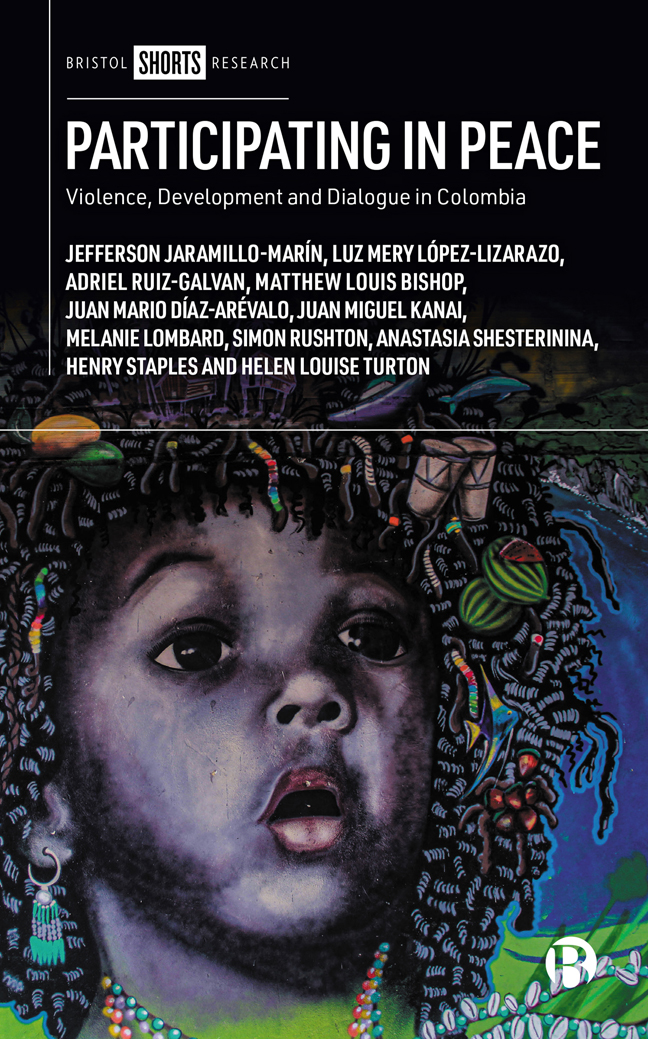Book contents
- Frontmatter
- Contents
- List of Maps and Tables
- List of Abbreviations
- Notes on the Authors
- Acknowledgements
- Note on the Cover Image
- Introduction
- One Peace through Participation: The Colombian Experience
- Two Participation through Dialogue: Co-Producing Peace and Research
- Three Protecting Catatumbo: Dialogue as Conflict-Sensitive Environmentalism
- Four Transforming Buenaventura: Dialogue for Municipal Peacebuilding
- Conclusion
- References
- Index
Introduction
Published online by Cambridge University Press: 24 January 2024
- Frontmatter
- Contents
- List of Maps and Tables
- List of Abbreviations
- Notes on the Authors
- Acknowledgements
- Note on the Cover Image
- Introduction
- One Peace through Participation: The Colombian Experience
- Two Participation through Dialogue: Co-Producing Peace and Research
- Three Protecting Catatumbo: Dialogue as Conflict-Sensitive Environmentalism
- Four Transforming Buenaventura: Dialogue for Municipal Peacebuilding
- Conclusion
- References
- Index
Summary
In August 2022, Colombians elected, for the first time, a left-leaning government. Led by former guerrilla activist Gustavo Petro and his Vice President Francia Márquez, an Afro-Colombian woman and well-known advocate for human rights and environmental justice, the shift in governmental discourse was immediately striking. President Petro used his inauguration speech to promise that he would deliver Paz total (total peace), which would involve entering into talks with a wide range of armed groups to tackle the violence that has continued – indeed, in some areas has increased – in the years since the peace agreement between the government and the Fuerzas Armadas Revolucionarias de Colombia (Revolutionary Armed Forces of Colombia; FARC) was signed in 2016. Essential to total peace would be not only those new negotiations, but also fully implementing the terms of the 2016 agreement itself. Former President Iván Duque's (2018–22) failure to do so had caused widespread disillusionment with the peace process, and had also spurred splinter groups from the FARC to continue in arms.
Hopes for a stable and lasting peace in Colombia will depend in part on Petro's success in persuading the wide range of guerrilla, paramilitary and criminal groups still active in the country to cease the violence and lay down their weapons. But Petro was clear that total peace would also need to be a project for the whole of society:
For peace to be possible in Colombia we need dialogue, a lot of dialogue, to understand each other, seek common paths, and produce change … Our future is not written. We own the pen and we can write the page together, in peace and togetherness. Today, we start the Colombia of the possible.
(Petro, quoted in Emblin, 2022)This book is interested in how, in the years before and since the 2016 peace agreement, communities have been using dialogue as a way of participating in the building of peace, often in relatively unpromising circumstances. Seeking to understand the dynamics of community-level dialogues that aim to deal with the legacies of earlier violence and overcome ongoing conflicts, the book takes a ‘bottom-up’ look at the building of peace.
- Type
- Chapter
- Information
- Participating in PeaceViolence, Development and Dialogue in Colombia, pp. 1 - 10Publisher: Bristol University PressPrint publication year: 2023



